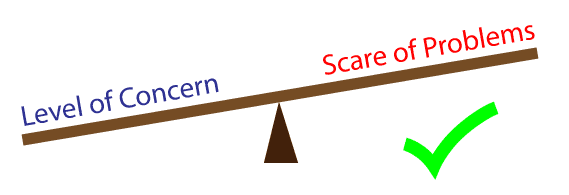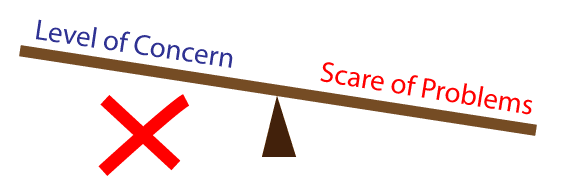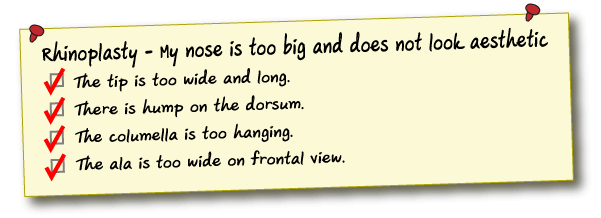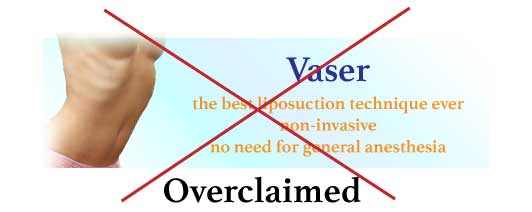5 most important questions
When you are about to commit for a plastic or cosmetic surgery in Thailand, I suggest you ask yourself some questions first.
At this time I have only 5 major questions that must be clearly answered before making up your mind. I am pretty sure that answering these questions in order can guide you to the right track.
1. Should I have plastic surgery?
It might sound too easy for many but please re-think about this.

If you keep thinking about the defected appearance of your body part(s), having plastic surgery will be worth. Let's say you think about it every day or every week. It bothers you very much.

But if you only sometimes think about it and feels so scared about surgery, do not proceed. You will be fine without any plastic surgery. Don't do it because there is discount or the procedure sounds non-invasive, simple and painless or you have just broken up with your boyfriend.
Cosmetic surgery is for pleasure, not illness (for which treatment is needed). Cosmetic surgery can also have complications or side effects, just like any surgery. If your appearance does not really bother you, you will regret only with one minor complication or side effect.
On the other hand, people who are very much bothered by the appearance can be extremely happy with moderate improvement of that body part, even with some complications and side effect such as imperfect scar, wound infection, slight asymmetry.
2. What are my expectations?
Do you really know how your new appearance should be?
Can you imagine what the body part should look like?
Do you truly know how you dislike that body part?
Best scenario
**The best is that you can objectively demonstrate your expectation to your surgeon. Your job is to do everything to make sure your doctor really understand what you want, e.g. by explanation, photos, video, etc, and he will tell you what procedures to go with.

Worst scenario
If you only know that part does not look good, do not decide yet. If you proceed, it is very likely that you will be a victim.
When you do not know your problem well, the most common question you will ask your doctor is "what procedure/technique/implant do you recommend?". Unfortunately this question often make you pay for unnecessary or wrong surgical procedure. They already want your money! They might be able to do some procedures but not the others. Remember, very few surgeons recommend the procedures they cannot perform.
When you do not even know how you hate your body part and how it should be changed into, you tend to rely on what your doctor suggests. Bad news is doctors do not always know the best answer or choose something that matches your case. It is well known failed cosmetic surgery is most commonly caused by result that does not match patient's expectation.
If you really do not know the problem root, your surgeon must be able to analyse your body part and tell you what is wrong. Unfortunately the situation now lies on you completely whether to believe it or not.
Example 1
My friends often tell me I look sad, old and tired.
Surgeon A's analysis: You have skin excess at the upper eyelids.
Surgeon B's opinion: You should have brow lift instead of upper eyelid surgery.
Proper solution: See more surgeons and research more about upper eyelid surgery and brow lift. Then you can decide which procedure you prefer, not what your surgeon likes to do.
Example 2
I want to have full, perky breasts but still natural.
Surgeon A's analysis: You should use smooth, round implants of 350 cc.
Surgeone B's opinion: You should use teardrop implants of 400 cc.
Proper solution: Research more about the implant shape. Show the surgeons some photos of your preferred breast shape. Both surgeons recommends teardrop implants for less fullness of the upper poles. Surgeon A suggests you use 400 cc. Surgeon A gives you different breast implant sizes to try until you are happy with a size (let's say 325 cc). You should go with Surgeon A.
3. Do I know enough about the procedure?
Knowing (1) and (2) is still not enough.
After being sure you really want to change your appearance and having the exact expectation, you should discuss with your surgeon until you have the most appropriate procedure. Then ask questions to the point you know that procedure well.
It is wise to go back home for more research in order to know what it is but do not believe in what you find from the internet. It is better to go back to the doctor or seek for second opinion to confirm the knowledge you self study. Information from the internet is often wrong and misleading by marketing technique.

What to know?
- How is the procedure performed?
- Local or general anesthesia (IV sedation, full anesthesia with endotracheal tube?)
- What can complications and side effects be possible?
At this point you will have something in your gut. Your instinct usually tells you whether the whole thing is right for you or not. If yes, move further to question 4.
4. Who will be the best surgeon for me?
During the process of answering the previous 3 questions, most will already find their surgeons.
Universally your choice of surgeon should: -
- be board-certified plastic surgeon
- have enough experience
- have regular refreshing courses to update his/her knowledge
Board-certified plastic surgeon
Having formal training in plastic and reconstructive surgery is critical. Formal training in this specialty turns a doctor into a specialist who knows well about surgery in general and about plastic and aesthetic surgery in depth. This is not different from developed countries like USA and Europe.
After a complete training of 5 years, the doctor gets a "Board" from Thai Medical Council and becomes "board-certified plastic surgeon", which is the only internationally accepted term for the real plastic/cosmetic surgeon. In Thailand, this "board-certified" must be affiliated with
- The Society of Plastic and Reconstructive Surgeons of Thailand OR
- The Society of Aesthetic Plastic Surgeons of Thailand only.
Organizations other than the above 2 societies mean fake plastic surgeons.
Anything that is not called "board-certifiec in plastic surgery" is not plastic surgeon.
Examples of Non-plastic surgeon/Fake plastic surgeon
- Facial Plastic and Reconstructive Surgeon/Surgery
- Anything with the word "Academy", e.g. American Academy of Aesthetic Medicine, American Academy of Cosmetic Surgery
- Anything with the word "Cosmetic" in the doctor's education or affiliation
- Certificate of Training = short period of visiting another doctor's place
In Thailand, things might be different from your culture.
- Good doctors do not advertise. Good doctors do not say good things about themselves very clearly. Thai people are usually humble and shy to say they are great.
- There are only around 300 board-certified plastic surgeons in the whole Kingdom of Thailand but there are several thousand cosmetic clinics and services. This means most of them are not plastic surgeon!
- Many Thai plastic surgeons do not speak English very well and do not have web sites in English. This means what you see in the internet is a very small portion of real, excellent plastic surgeons in practice in this country.
The best method to know a doctor's education
At the web site of Thai Medical Council, there is a web page that can show doctor's training. Unfortunately it is available in Thai language only! Perhaps you have to email the Council and ask.
The best method to know if a doctor is plastic surgeon
Go to the official web site of the Society of Aesthetic Plastic Surgeons of Thailand (www.thprs.org) for the list of plastic surgeons who finish their training for more than 3 years. If you cannot find your doctor's name on the list, you can email the Society and response is usually within a few days.
Enough experience?
After full training in plastic and reconstructive surgery, one needs time and practice to become capable of achieving successful plastic and cosmetic surgery. This is true for all professions.
The easiest way to know is you ask direct question to your doctor.
"When do you finish your training in plastic surgery?"
Regular Refreshing Courses?
For a profession, attending refreshing courses regularly is absolutely essential to catch up with updates. Technology evolves too quickly. You surely do not want to be under the care of surgeon who uses knowledge and technique learned 10 years ago.
Unluckily this information is rarely visible when looking at a doctor's profile. At this moment I cannot figure out how a patient can search for this information unless the doctor is asked directly.
5. Where should I have the surgery done?
Surgery done in clinic is usually cost saving. We cannot refuse that good result is achievable in clinic-based practice. Nevertheless there are some indications that prefers hospital than clinic.
- Surgery that involves implants and bone - Operating room in clinic is never as good as hospital in term of infection. Material, dust protection, laminar flow, temperature control are examples of the differences.
- Surgery to be done under general anesthesia or even IV sedation - Anesthesiologist and anesthetic equipments are the key of safety. Death is most commonly associated with office surgery done under IV sedation without anesthesiologist.
- High-risk patients - Very young or old people with serious personal illness and multiple drug allergy shall have advantage if surgery is done at hospital.
- Procedures that require injection of large amount of anesthetic drug e.g. large-volume liposuction - When something is wrong, life saving equipment and personnel are always more readily available at hospital.
I put Place of Surgery at the last because doctor is a much more critical factor. Normally good doctors will do surgery in good places for good result so as to keep their good reputation.
But because most of you do not know your doctor before, you ought to be careful until the last minute. Help yourself by checking conditions of the operative theater for cleanliness, life-saving equipments, medical supply, quality of personnel. If you do not feel alright, it is worth discontinuing the surgery even though you might lose your deposit money.
Summary
Although there are more things you should know before commiting in having a cosmetic surgery, I think these 5 questions are the basic and most important. Once you know for sure what to expect and who to do the surgery for you, everything else seems to be minor.
June 21, 2021